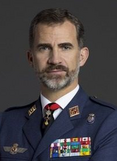User:Krugmar/Sandbox1: Difference between revisions
m (→History) |
m (→Politics) |
||
| Line 177: | Line 177: | ||
|caption1=[[Queen of Temera|Queen]] [[Głurzana I]] | |caption1=[[Queen of Temera|Queen]] [[Głurzana I]] | ||
|alt1= | |alt1= | ||
|width2= | |width2=117 | ||
|caption2={{wp|Regency|Prince-Regent}} [[Filip, Duke of Tarnov]] | |caption2={{wp|Regency|Prince-Regent}} [[Filip, Duke of Tarnov]] | ||
|image2=DukeFelipe.png | |image2=DukeFelipe.png | ||
| Line 184: | Line 184: | ||
|caption3={{wp|Prime Minister}} [[Marzyn Izłarzany]] | |caption3={{wp|Prime Minister}} [[Marzyn Izłarzany]] | ||
|image3=Jarosław_Kaczyński_Sejm_2016a.JPG | |image3=Jarosław_Kaczyński_Sejm_2016a.JPG | ||
| | |alt3= | ||
}} | }} | ||
| Line 190: | Line 190: | ||
===Government=== | ===Government=== | ||
===Administrative divisions=== | |||
===Foreign relations=== | |||
===Military=== | |||
==Economy== | ==Economy== | ||
Revision as of 16:16, 8 July 2019
Crown of Temera | |
|---|---|
| Capital | Rivne |
| Official languages | Temeran Wazovian |
| Recognised national languages | Gaullican |
| Recognised regional languages | Amathian Slezan |
| Leaders | |
• Queen | Głurzana I |
| Filip, Duke of Tarnov | |
| Marzyn Izłarzany | |
| Legislature | Koroć Żeniarały |
| Kębra Nubły | |
| Kębra Komyni | |
| Population | |
• 2018 census | 16,203,405 |
Temera (Temeran: Ciamraje), officially the Crown of Temera (Temeran: Koruna Ciamraja), is a country located in Western Euclea.
Etymology
Temeriae -> 1. Tǐměrjě -> 2. T'ьm'rějě -> 3. Ciamrějě -> 4. Ciamraje
prōvincia -> 1. prŭvěncja -> 2. prъvěnʲdjě -> 3. prevʲěńdzě -> 4. provjandze
History
Prehistory and protohistory
-Mostly Celtic
Antiquity
-Solarian Empire -Slavic migrations
Early Middle Ages
Late Middle Ages
Early Modern period
Modern period
Contemporary period
Geography
Politics
Temera is a unitary state under a constitutional monarchy. Queen Głurzana I is the monarch and head of state of Temera. The constitution grants the monarch executive and honorific powers. They preside over the Privy Council; appoints the Prime Minister, usually from the political party that has won the most seats in the parliamentary elections, and on recommendations from the latter, appoints the members of the government. The monarch also has the power to terminate the tenure of any minister, and to unilaterally dissolve the Parliament, suspend the constitution, call for new elections, or rule by decree. The only time this happened was in 19xx. The monarch is formally the commander-in-chief of the armed forces.




